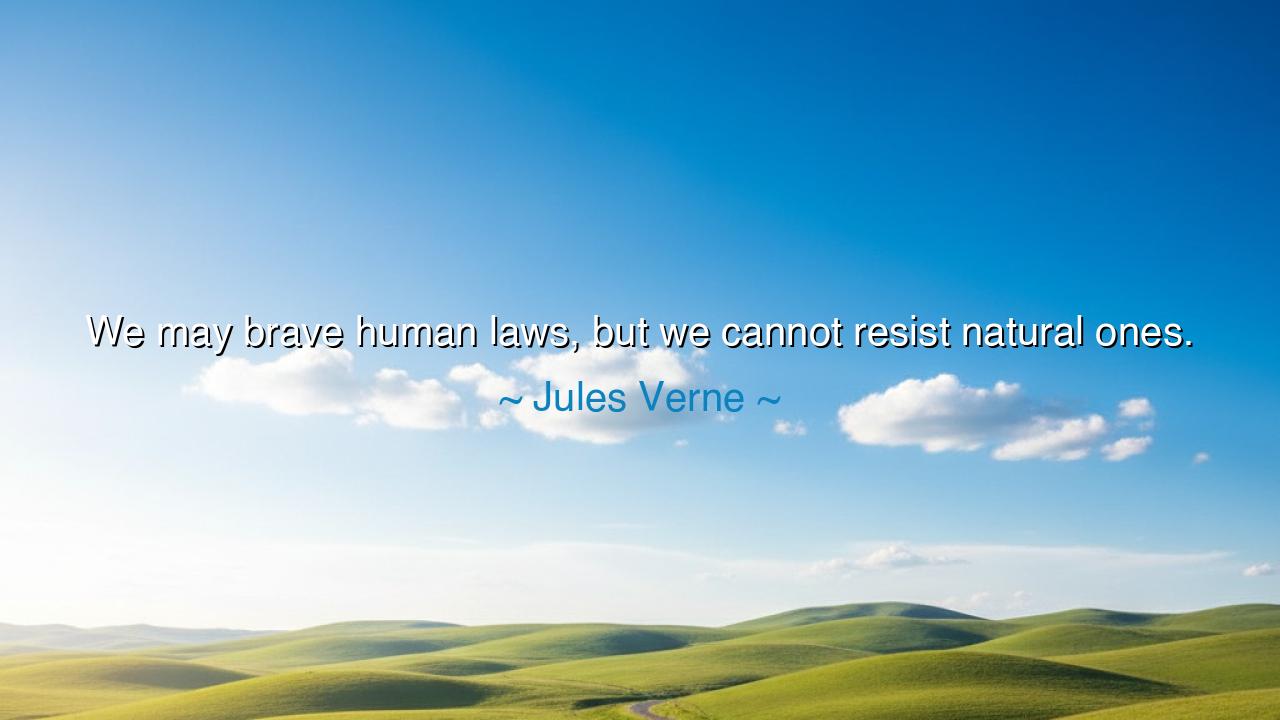
We may brave human laws, but we cannot resist natural ones.






The words of Jules Verne, “We may brave human laws, but we cannot resist natural ones,” strike like thunder across the valleys of time. In them lies the voice of wisdom that reminds mankind of his limits. For though kings may decree and parliaments may legislate, though emperors may command and armies may enforce, the laws of nature stand beyond repeal, beyond corruption, beyond the reach of human pride. The edicts of men are but whispers in the wind; the decrees of nature are the bedrock upon which existence rests.
Verne, that prophet of exploration and dreamer of worlds yet unseen, knew well the power of natural law. His tales of voyage beneath the seas and journeys to the heart of the earth were not fantasies detached from reality, but songs woven with respect for the immutable order of the cosmos. He understood that man, for all his daring, remains subject to the pulse of tides, the pull of gravity, the breath of storms. To trespass against nature is not rebellion but folly, for nature punishes without malice and rewards without favoritism.
Consider the fate of the Titanic, that proud vessel of steel and splendor. Built in defiance of humility, called “unsinkable” by the tongues of men, it sailed as though human law had triumphed over ocean and wave. Yet in one cold night upon the Atlantic, an iceberg—silent, ancient, unyielding—proved otherwise. No boast, no command, no decree could save the ship once natural law asserted its dominion. There, in that moment of ruin, the truth of Verne’s words shone forth: one may ignore the statutes of men, but never the statutes of creation.
And yet, this truth is not meant to crush the spirit of man, but to guide it. For the wise do not fight against natural law, they walk with it. The farmer who sows in season reaps his harvest, but the one who scorns the rhythms of earth finds only barren soil. The sailor who reads the stars and respects the sea may cross the globe, while the one who defies the tempests finds his ship broken on the rocks. To heed nature is not submission—it is alignment with the great harmony of existence.
Look also to the heroes of science, men and women who sought not to overthrow nature, but to understand it. Galileo, peering through his glass, revealed that the earth itself moved in obedience to celestial law. Marie Curie, risking her life in the pursuit of knowledge, unveiled the hidden fire of radiation—power that obeyed not human ambition but the eternal laws of matter. These figures did not resist nature; they listened, they learned, and through reverence they unlocked its power for the good of humankind.
The lesson, therefore, is plain: live with humility before the laws of nature. Know that human decrees may bend and even be broken, but the pulse of earth, sea, and sky cannot be resisted. The wise heart accepts this and turns it into strength. To live in harmony with nature is not weakness but wisdom, not resignation but resilience. For in following her rhythms, man finds both survival and greatness.
Practically, let each person cultivate this reverence. Care for your body, for its natural laws are unyielding: neglect it, and it will fail you. Respect the land, for to strip it without mercy is to court famine and flood. Honor the balance of the air and the sea, for to poison them is to poison yourself. And when ambition swells within you, remember always the boundary set by the cosmos: you are not its master, but its steward.
So let Verne’s words echo as a warning and as a call to wisdom: human law may bend and falter, but natural law remains eternal. Walk not in arrogance, but in awe. Stand not in defiance, but in partnership. For to resist nature is death, but to honor her is life everlasting.






AAdministratorAdministrator
Welcome, honored guests. Please leave a comment, we will respond soon